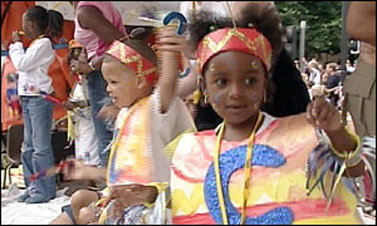
Carnival 300 Picture of the St Pauls Carnival in Bristol from the website of the BBC World Service
The Notting Hill carnival, the first major public event in Britain celebrating black culture, began in 1959 as a gesture of defiance following the murder of Kelso Cochrane, a Jamaican. It was founded by Claudia Jones, a political activist who had been deported from America in 1955 and had received asylum in Britain. Like Jones, most of the immigrants living in Notting Hill were originally from Trinidad, which had the most highly developed carnival tradition. Carnivals later developed in Bristol's St Pauls district, Manchester, Leeds, Birmingham and other cities. Jones had also launched and edited the campaigning journal the West Indian Gazette, which folded on her death in 1964. Other publications that have been produced for a black British readership include Voice Newspaper, Caribbean Times, West Indian World, West Indian Digest, African Times and ROOT magazine.
Mike and Trevor Phillips have written: 'Everything which symbolises the presence of Caribbean migrants... faces in two directions.' They continue:
The culture we created allowed us to face towards the Caribbean and towards the African diaspora, but it also opened a doorway into some of the deep structures of British life. British 'black culture' from the beginning, therefore, was dynamic and ambiguous, swapping values between four or five different sources, tapping whatever roots were available and useful... [T]he dynamic of the culture [black people] have built is everything to do with following the logic of their escape from the Caribbean, towards the process of managing a hostile urban environment and infiltrating is structures. The product which has resulted is unique and unmistakeable, but also marked by the ambiguity and many-sided quality of black British life.
The following extracts are from interviews with people reflecting on what it has meant to be a first-generation black person in Britain. They come from the book With Hope in their Eyes by Vivienne Francis, which was published to coincide with the 50th anniversary of the arrival of the Empire Windrush.
I have got my house here in England, so this must be my home. I have some loyalty here because it gave me my life to which I am accustomed. By the same token, I can't forget my roots or the people I grew up with. Friends, my teachers, my whole life was shaped by the people who I met in my formative years in St Lucia. Ben Bousquet who arrived in Britain from St Lucia in 1956. |
 |
England is not the Motherland. I feel, like many, let down. There was not as much as a hand stretched out to help us. A lot of us didn't come to spend more than five years, but fifty years later we are still here. At school we used to sing 'Land of Hope and Glory', then I came to England and found out what that actually meant....
I've never seen myself as British. I don't think my children see themselves as British either. I don't think that time will ever come. Even other cultures who come here, I doubt they ever feel British. T Cooper who arrived on the Windrush at the age of 23
I have exceeded my ambitions in Britain. If I had stayed in Trinidad all this would probably not have happened...
But, of course, there are things that I feel sad about life in England. Particularly the Immigration Acts. When Maggie Thatcher came to power she said that Britain was being swamped by 'an alien culture', and our automatic right to a British passport was taken away.
I also feel very bitter about black deaths in police custody. All we have heard is excuses as to why people have died.
I don't see Britain as the Motherland. No mother kills its babies and legitimises the killing. Any mother that does this and continues to do this must be insane. What I have achieved here is down to me not due to anything that was given to me.
We have achieved in Britain, in spite of the difficulties we found here. We achieved excellence in adversity. It shows the strength of black people. Clarence Thompson who arrived in Britain from Trinidad and Tobago in 1960
I can't say that I have ever experienced any racial or colour problems in my years in Britain. If I have, I didn't notice them.
Went back to Trinidad in 1980s but it was too hot. I have been here more years than I was in Trinidad. I see myself as a Trinidadian living in Britain, even though I have lived here so long I always stress the Trinidadian connection. But things have changed too much for me to go back to Trinidad. Kelvin Cook-Mohammed who arrived in Britain from Trinidad in 1956
It's very difficult to say whether I would make the same decision to come here, if I could turn back the clock. Coming here I did gain a lot of experience, I think I understand more clearly how the white people think and act. I have also realised how many black people threw our race down the drain. I go back to Jamaica every year, but it's too late to go back permanently. George Powe from Jamaica who came to Britain in 1943
Some people call themselves African Americans, I don't want to be called no damn African Caribbean. Call me a Jamaican. That's where I was born. My birth certificate says nothing about African. I do have African blood in me, but I have other bloods too - Scottish, Indian, Lebanese. So why may I just hang on black and African? Connie Marks who arrived in Britain from Jamaica in 1954. |

